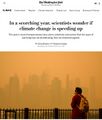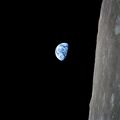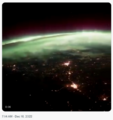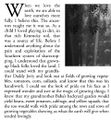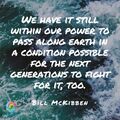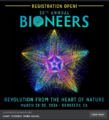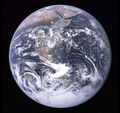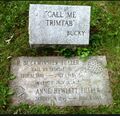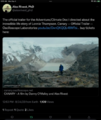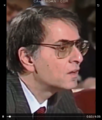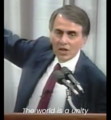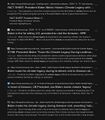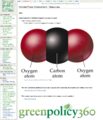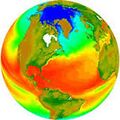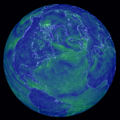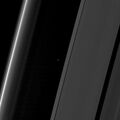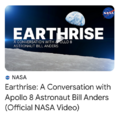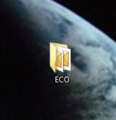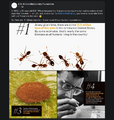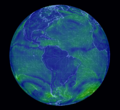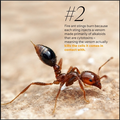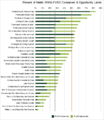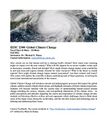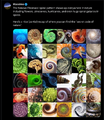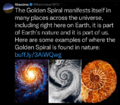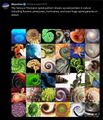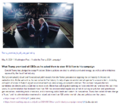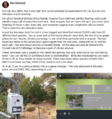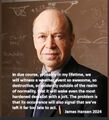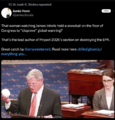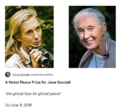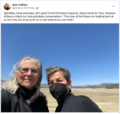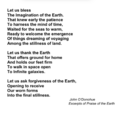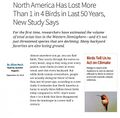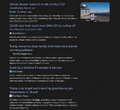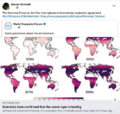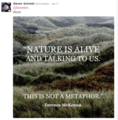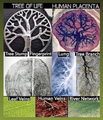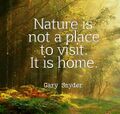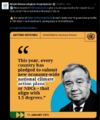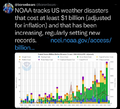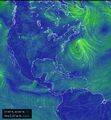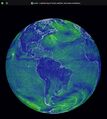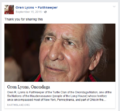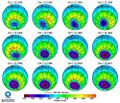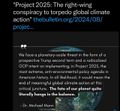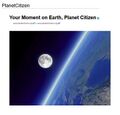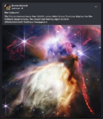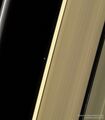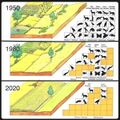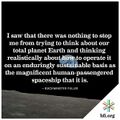Category:Nature: Difference between revisions
Siterunner (talk | contribs) No edit summary |
Siterunner (talk | contribs) No edit summary |
||
| Line 8: | Line 8: | ||
Circa 2020 / Excerpt | Circa 2020 / Excerpt | ||
* https://en.wikipedia.org/wiki/Naturalism_(philosophy)#Methodological_naturalism | |||
'''''Methodological naturalism''''' | '''''Methodological naturalism''''' | ||
Revision as of 13:16, 20 October 2021
<addthis />
Naturalism, Philosophy
Via Wikipedia
Circa 2020 / Excerpt
Methodological naturalism
Methodological naturalism, this second sense of the term "naturalism", seeks to provide a framework of acquiring knowledge that requires scientists to seek explanations of how the world around us functions based on what we can observe, test, replicate and verify. It is a distinct system of thought concerned with a cognitive approach to reality, and is thus a philosophy of knowledge. It is a self-imposed convention of science that attempts to explain and test scientific endeavors, hypotheses, and events with reference to natural causes and events. [48]
Steven Schafersman states that methodological naturalism is "the adoption or assumption of philosophical naturalism within the scientific method with or without fully accepting or believing it ... science is not metaphysical and does not depend on the ultimate truth of any metaphysics for its success, but methodological naturalism must be adopted as a strategy or working hypothesis for science to succeed. We may therefore be agnostic about the ultimate truth of naturalism, but must nevertheless adopt it and investigate nature as if nature is all that there is."[25]
Studies by sociologist Elaine Ecklund suggest that religious scientists in practice apply methodological naturalism. They report that their religious beliefs affect the way they think about the implications – often moral – of their work, but not the way they practice science.[49]
In a series of articles and books from 1996 onward, Robert T. Pennock wrote using the term "methodological naturalism" to clarify that the scientific method confines itself to natural explanations without assuming the existence or non-existence of the supernatural, and is not based on dogmatic metaphysical naturalism. Pennock's testimony as an expert witness[50] at the Kitzmiller v. Dover Area School District trial was cited by the Judge in his Memorandum Opinion concluding that "Methodological naturalism is a 'ground rule' of science today":[51]
"Expert testimony reveals that since the scientific revolution of the 16th and 17th centuries, science has been limited to the search for natural causes to explain natural phenomena.... While supernatural explanations may be important and have merit, they are not part of science." " It is a "ground rule" that "requires scientists to seek explanations in the world around us based upon what we can observe, test, replicate, and verify.[48]
Eugene Scott stated:
A clear distinction must be drawn between science [methodological naturalism] as a way of knowing about the natural world and science [philosophical naturalism] as a foundation for philosophical views. One should be taught to our children in school, and the other can optionally be taught to our children at home. ... Even someone who may disagree with my logic or understanding of philosophy of science often understands the strategic reasons for separating methodological from philosophical materialism [naturalism]—if we want more Americans to understand evolution.[52] She suggests that scientists can defuse some of the opposition to evolution by first recognizing that the vast majority of Americans are believers, and that most Americans want to retain their faith. She believes that individuals can retain religious beliefs and still accept evolution through methodological naturalism. Scientists should threfore avoid mentioning metaphysical naturalism and use methodological naturalism instead.[53] Schafersman writes that "while science as a process only requires methodological naturalism, I think that the assumption of methodological naturalism by scientists and others logically and morally entails ontological naturalism",[25] and "I maintain that the practice or adoption of methodological naturalism entails a logical and moral belief in ontological naturalism, so they are not logically decoupled."[25] Strahler agrees: "The naturalistic [ontological] view is that the particular universe we observe came into existence and has operated through all time and in all its parts without the impetus or guidance of any supernatural agency. The naturalistic view is espoused by science as its fundamental assumption."[29]
○
Remember, in our deepest soul, is our nature, ourselves, our inherited humanity. Unmediated, without any modern device in our hands, or in front of our face delivering content and data. Nature is not mediated. Nature is best delivered as is, nature unspoiled, to be taken in, to reveal the natural world and change our world naturally, to show us, educate us, help us become more of our true and better selves. -- GreenPolicy360
Nature was always present... It was participant, impetus, and catalyst. It was the riches that made nations wealthy and powerful, and over which their armies fought; it was the wildness our ancestors insisted on taming, the scourge that left them despairing, and the blessing that kept them alive. How and where and by what design people built their homes and businesses depended on natural conditions and endowments. Inspirations for what people wrote and painted, what they wore, and said to each other, how they planned their day and spent their leisure time, and what they chose as a livelihood all flowed from an organic setting. Nature shaped strategies in war and gave form to economics, and its wealth or privation determined that of people and their enterprises.
- -- The Gulf
- by Jack E. Davis
○
Subcategories
This category has the following 19 subcategories, out of 19 total.
A
B
C
E
F
G
M
N
P
R
W
Pages in category "Nature"
The following 60 pages are in this category, out of 60 total.
B
E
- Earth Day
- Earth Day Is Every Day
- Earth Day Memories on the 50th Anniversary
- Earth Imaging-New Space
- Earth Science Vital Signs
- EarthPOV
- Ecolivia
- Environmental agreements
- Environmental Art
- Environmental Law, Rollbacks under Trump 2016-20
- Environmental Laws and Modern Environmental Movement
- Environmental protection
- Environmental Protection Agency
- EOS eco Operating System
G
P
Media in category "Nature"
The following 200 files are in this category, out of 250 total.
(previous page) (next page)- 3M lawsuit re forever chemicals - June 2023.png 603 × 600; 357 KB
- 51295873 824189667934543 1922826986921656320 n.jpg 498 × 689; 95 KB
- A land ethic .jpg 864 × 668; 79 KB
- A Planet Citizen View.png 799 × 1,241; 1.64 MB
- A scorching year, what about the 360 warming data.jpg 600 × 706; 106 KB
- A War on Science.png 800 × 389; 705 KB
- About Baselines and Change.png 592 × 312; 33 KB
- Actually watching the planet breathe.png 800 × 446; 649 KB
- All species day with homo sapien in Santa Fe .jpg 640 × 369; 98 KB
- All species day.jpg 1,280 × 737; 272 KB
- Amazon-rainforest.jpg 814 × 459; 142 KB
- Anthropocene Project-3a.png 800 × 599; 1.28 MB
- Apollo.jpg 715 × 715; 102 KB
- Asia Society exhibit 2024 - Mount Everest glacier, then and now.jpg 800 × 594; 178 KB
- AskNatureAvatar s.png 200 × 200; 14 KB
- Audubon study ms.png 529 × 434; 437 KB
- Aurora Green 2022.png 600 × 638; 330 KB
- Bamboo-800x200.jpg 800 × 200; 43 KB
- Battle for Democracy.jpg 640 × 123; 24 KB
- Be kind-2.jpg 250 × 164; 20 KB
- Before the Whoosh Transformation.jpg 327 × 267; 39 KB
- Bell hooks - when we love the earth.jpg 480 × 517; 128 KB
- Biden re Earth Day 2023.png 640 × 400; 155 KB
- Biggest little farm-1.jpg 800 × 533; 123 KB
- Bill McKibben to next generations.JPG 700 × 700; 203 KB
- Biodiversity COP15 Conference - Dec 2022.png 640 × 417; 637 KB
- Biodiversity COP15 News - 1.png 600 × 687; 288 KB
- Biodiversity COP15 News - 2.png 600 × 636; 340 KB
- Biodiversity-by-dreamchaotic.jpg 600 × 173; 66 KB
- Bioneers 35.png 480 × 528; 356 KB
- Bioneers It's all connected - 30th annual conference.jpg 527 × 521; 79 KB
- Blue Marble photo - Apollo 17.jpg 642 × 605; 129 KB
- Bucky Trimtab.jpg 348 × 336; 88 KB
- Butterflyelements.jpg 250 × 198; 91 KB
- California's kelp forests and coastal biodiversity diminished.png 532 × 754; 307 KB
- Canary - 1.jpg 448 × 901; 144 KB
- Canary - 2.png 446 × 531; 264 KB
- Carl Sagan at the Emerging Issues Forum - 1990.png 360 × 460; 192 KB
- Carl Sagan at the Emerging Issues Forum.png 747 × 600; 600 KB
- Carl Sagan, 1985.PNG 480 × 566; 331 KB
- Carl Sagan, the atmosphere unifies and connects all of our world.png 360 × 390; 229 KB
- Change.jpg 800 × 473; 73 KB
- Citizen of the planet girl.jpg 400 × 265; 35 KB
- Climate Legacy of Biden.jpg 600 × 687; 265 KB
- Climate News Dec 4 2023 in Dubai.png 800 × 1,037; 649 KB
- Climate Plans Enforcement - Resources - GreenPolicy.png 768 × 897; 686 KB
- Climate Science Research Studies Featured from 2024.jpeg 640 × 431; 119 KB
- ClimateNews 360.jpg 172 × 172; 9 KB
- COP28 News - Dec 13 2023.png 800 × 898; 410 KB
- Coral reef rejuvenation-montage.png 569 × 236; 318 KB
- Daisy Chain Hippie.jpg 564 × 362; 30 KB
- Ddt-spray-kids-in-florida.jpg 640 × 360; 101 KB
- Don Perry In the Canopy first-gen canopy web.jpg 720 × 487; 81 KB
- DON PERRY RAIN-FOREST-AERIAL-TRAM m.jpg 475 × 707; 139 KB
- Don Perry, Life Above the Jungle Floor.jpg 600 × 800; 191 KB
- Dragonfly Eyes.jpg 800 × 534; 68 KB
- Dragonfly3.jpg 700 × 464; 36 KB
- Earth Breathing.jpg 800 × 450; 117 KB
- Earth conditions dynamic map.png 673 × 673; 770 KB
- Earth Day 50th Golden Anniversary.gif 360 × 480; 1.23 MB
- Earth Day Flag.png 400 × 267; 69 KB
- Earth Day memories.png 800 × 210; 381 KB
- Earth Day Year-Round.png 600 × 721; 208 KB
- Earth dynamic global map.png 555 × 480; 390 KB
- Earth Emoji.png 50 × 50; 2 KB
- Earth grassroots.jpg 374 × 238; 32 KB
- Earth in Human Hands Intro.png 622 × 423; 121 KB
- Earth in Our Hands.png 76 × 76; 5 KB
- Earth, our home, 7.7 billion humans on that dot of life.jpg 680 × 680; 50 KB
- Earth-Day.png 336 × 336; 55 KB
- Earth-NASA.jpg 800 × 265; 39 KB
- Earthrise - NASA - Astro Bill Anders.png 497 × 479; 216 KB
- ECO.png 182 × 188; 39 KB
- Ecology-symbol Ron-Cobbs-1969.png 250 × 200; 13 KB
- Einstein - the whole of nature 1.PNG 444 × 619; 216 KB
- Einstein - the whole of nature 2.JPG 680 × 623; 110 KB
- Entangled Life by Merlin Sheldrake.jpg 800 × 306; 70 KB
- Environmental Security and a Thin Blue Layer around the Home Planet.png 800 × 308; 322 KB
- EO and Fire Ants in the US - on World Wildlife Day.png 768 × 811; 663 KB
- EO Snapshot 6-29-2016 10-44-49 AM.png 839 × 768; 907 KB
- Eukaryotic Cell SCU.jpg 716 × 1,024; 799 KB
- Everest - Long lens photo from the ISS.jpg 800 × 530; 139 KB
- Everest fly over by ISS 2019.jpg 800 × 528; 72 KB
- Everest region - NASA photo.jpg 800 × 530; 189 KB
- Every Day Is Earth Day.png 590 × 125; 30 KB
- Eyes of the Animal 1a.png 905 × 471; 542 KB
- Facts about US Energy Use.jpg 697 × 600; 101 KB
- Fire Ants.png 601 × 600; 603 KB
- Florida via NASA 2022.png 800 × 1,020; 1.12 MB
- Florida Wildlife Corridor - 2022 illustration.png 800 × 628; 473 KB
- Florida Wildlife Corridor FLWC Water Benefits December 2022.png 768 × 886; 109 KB
- For Wildlife.jpg 444 × 640; 224 KB
- Forest Moss and unseen 'tiny little ones'.PNG 800 × 1,104; 1.53 MB
- Fox on Earth Day 2023.jpg 640 × 275; 58 KB
- From Our Peace Teach-ins in 1969 to a First Earth Day in 1970.png 800 × 1,037; 493 KB
- Global Climate Change textbook-Edition2.jpg 604 × 680; 96 KB
- Global Forest Watch top page 2014.png 800 × 416; 350 KB
- Golden spiral - Fibonacci spiral via Massimo 2023.png 768 × 883; 1.17 MB
- Golden Spiral from M.png 683 × 600; 487 KB
- Golden spiral, Fibonacci spiral, nature at work.jpg 755 × 883; 160 KB
- GP360 tagcloud2 m.png 531 × 324; 132 KB
- GP360 tagcloud2.png 655 × 400; 184 KB
- Green Branching Out.jpg 400 × 194; 35 KB
- Green Networking @GreenPolicy360.net.png 788 × 604; 764 KB
- Green Politics by Charlene Spretnak and Fritjof Capra.jpg 222 × 346; 21 KB
- Green Quotes - May 2022 - Green360.png 640 × 112; 46 KB
- GreenPolicy360 - May- 9-2024.png 800 × 406; 119 KB
- GreenPolicy360 - May-10-2024.png 790 × 694; 320 KB
- Greenpolicy360 logo 2med.png 493 × 88; 17 KB
- Haiku poems - Owl against a dusk sky - via Haiku Foundation.png 514 × 413; 144 KB
- Haikubox via RM citizen science.png 600 × 640; 466 KB
- Hand and Leaf w Life Lines.jpg 720 × 900; 41 KB
- Hawaiian fires and climate.jpg 600 × 600; 128 KB
- HFC Greenhouse Gas Global-Agreement-News Oct15,2016.png 974 × 768; 343 KB
- Huge heat anomaly in 2023 - by Gavin Schmidt.png 735 × 857; 172 KB
- Hurricane-Proofing-Home-2024-Miami-Florida.png 658 × 600; 652 KB
- In Love with Earth.jpg 328 × 499; 15 KB
- In nature, nothing exists alone.jpg 500 × 357; 26 KB
- James Hansen 2024.jpg 600 × 658; 110 KB
- James Inhofe -- and Project 2025.png 640 × 670; 566 KB
- Jane Goodall, conservationist awarded, January 2025.jpg 600 × 455; 81 KB
- Jane Goodall, Medal of Freedom.png 640 × 510; 644 KB
- Jane Goodall.png 699 × 642; 443 KB
- Joan and Christiana - April 2022.png 486 × 460; 282 KB
- John O'Donohue quote.png 358 × 336; 37 KB
- Kenny Ausubel quote.jpeg 415 × 163; 46 KB
- Laudate Deum - To All Peoples of Good Will - On the Climate Crisis.png 767 × 601; 112 KB
- Laudato Si conf-July 2018.png 590 × 318; 120 KB
- Laudato Si conference-July 2018.png 336 × 424; 267 KB
- Laudato Si Movement Invitation.jpg 633 × 480; 66 KB
- Laudato Si Movement.jpg 781 × 337; 40 KB
- Le Grand Bleu.png 738 × 1,107; 1.52 MB
- Leah Stokes - UCSB - Prof Climate and Energy Policy.png 640 × 476; 295 KB
- Life Above the Jungle Floor Don Perry.jpg 395 × 500; 74 KB
- Living Earth.png 441 × 183; 106 KB
- Loss of N American Birds - 1.jpg 800 × 788; 173 KB
- Lost Gospel of the Earth by Tom Hayden.jpg 696 × 1,069; 64 KB
- Lucy, hominid from the Rift.png 336 × 407; 251 KB
- Lunar Orbiter 1 First Earth Moon Image - 1966.png 656 × 805; 383 KB
- Lunar Orbiter 1 image of Planet Earth.png 800 × 551; 269 KB
- Map of the World wiki commons GTN800x370.png 800 × 370; 39 KB
- Mauna Loa-NOAA-Keeling Curve data at risk.png 800 × 730; 352 KB
- Michael E Mann reviews Don't Look Up - Dec 2021.png 796 × 1,639; 1.63 MB
- Milky Way comparison - 1.png 523 × 306; 337 KB
- Milky Way comparison - 2.png 523 × 299; 326 KB
- MLK - all life is interrelated.png 448 × 324; 397 KB
- Montreal Protocol update - Sept 2021.png 505 × 480; 291 KB
- Mother Earth-1.png 575 × 800; 98 KB
- Mother Earth.png 1,473 × 2,048; 481 KB
- Muir... Walk a dirt road.jpg 446 × 640; 61 KB
- Mushroom life in the forest.png 640 × 458; 626 KB
- NASA test mission to protect earth from asteroid - Nov 2021.png 508 × 800; 424 KB
- National Museum of Natural History - Smithsonian.txt.jpg 194 × 142; 14 KB
- Nature is alive Bioneers.png 589 × 598; 539 KB
- Nature Us and Veins of a Green Leaf.jpg 800 × 450; 122 KB
- Nature Us.png 480 × 557; 626 KB
- Nature.JPG 600 × 570; 142 KB
- Nazare Wave IX, Portugal.jpg 800 × 552; 100 KB
- NDCs 2025.png 600 × 722; 403 KB
- Nearly Every Country Signs On to a Sweeping Deal to Protect Nature.png 600 × 756; 311 KB
- Nelson, the oil spill and the student anti-war movement.png 600 × 457; 529 KB
- New Definitions of National Security demanded - January 2022.png 288 × 146; 21 KB
- Night skies.jpg 750 × 562; 21 KB
- NOAA - NCEI report on US temps 2023-2024.jpg 600 × 561; 109 KB
- NOAA extreme weather events charting.png 663 × 600; 288 KB
- NOAA report on heat records broken in US - 2023.jpg 600 × 480; 229 KB
- On Earth, GreenPolicy360, Clearwater, Florida.jpg 600 × 646; 175 KB
- On Planet Earth.jpeg 1,147 × 1,280; 328 KB
- One year of Earth from DSCOVR.png 800 × 564; 212 KB
- Oren Lyons, Onondaga.png 515 × 475; 168 KB
- Overshoot presentation - Rees 2.png 640 × 246; 81 KB
- Overshoot presentation by Prof William Rees - 2021.jpg 640 × 432; 76 KB
- Ozone depletion CFC's human-caused disruption.png 525 × 271; 45 KB
- Ozone depletion history nasa.jpg 500 × 428; 169 KB
- Ozone depletion monitoring 'ozone hole' relative to CFC regulation.png 640 × 449; 331 KB
- Pale Blue Dot - The Book by Carl Sagan 2.jpg 330 × 143; 17 KB
- Pandora to be found Exoplanets in Space.png 588 × 630; 488 KB
- Pedernal over Ghost Ranch, Georgia O'Keefe country, Northern NM.png 860 × 549; 568 KB
- Planet Dove satellite image over Dubai.png 800 × 791; 1.58 MB
- Planetary-Scale Threat.jpeg 640 × 593; 101 KB
- PlanetCitizen - Your Moment on Earth.jpg 650 × 625; 80 KB
- Primate Evolution - History of Our Tribe Hominini.png 524 × 800; 368 KB
- Red Crow Westerman.png 480 × 552; 694 KB
- Relational Reality.jpg 267 × 400; 53 KB
- Rep. George E Brown and a young student remembering.png 640 × 325; 109 KB
- Rho Ophiuchi.png 768 × 891; 1.06 MB
- Sagan-critical-thinking-course.png 800 × 474; 394 KB
- Saturn-Earth-Moon-from Cassini.jpg 800 × 913; 77 KB
- Save a Butterfly, Save a Species.png 1,024 × 167; 83 KB
- Seasons.jpg 542 × 480; 108 KB
- Seeds of Change, published 1994.png 628 × 763; 915 KB
- Seeds of Change.jpg 260 × 346; 27 KB
- Shifting Baseline Syndrome - threats to ecosystems biodiversity.png 431 × 534; 322 KB
- Shifting Baselines 2.jpg 600 × 600; 140 KB
- Spaceship Earth-Buckminster Fuller.jpg 600 × 600; 51 KB





